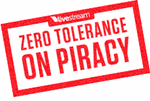
Streaming video service Livestream emailed their customers today about their zero tolerance on piracy policy. It’s yet another instance of Big Media being able to implement guilt by accusation.
I’ve just asked Livestream a few question:
Some questions about your “zero tolerance on piracy” policy. This is a media enquiry so please consider your response “on record”.
My questions concern due process.
I notice that you give “trusted rights holders” a tool to automatically shut down channels at their own instigation. I also notice that your example trusted rights holders are “Fox, Disney, NBA, MLB, NFL, UEFA, International Olympic Committee, WWE, UFC, Warner Bros, English Premiere League and British Sky Broadcasting”, i.e. the big end of the commercial media industry.
Most importantly, I notice that anyone who believes that the shutdown was in error must appeal the case afterwards.
Surely this process is “guilt by allegation” and puts the burden of proof onto a channel holder who is likely to have fewer legal resources than a big media player? Yet in most copyright regimes a channel holder may have legitimate “fair dealing” rights to rebroadcast material, such as for academic purposes, news reporting, review, or even satire.
When developing your policy, what input did you seek from people outside Big Media?
What processes do you have in place to perform follow-up “spot checks” of channel shutdowns? Do you actively contact channel holders for their side of the story? Do you inform channel holders of their legitimate “fair dealing” rights?
How long on average does it take you to process an appeal against a shutdown? What has been the longest time it has taken, and what was that case?
What assurances must “trusted rights holders” give to earn that trust? What training or other direction are they given in the legitimate rights of channel holders? What penalties do you impose on “trusted rights holders” who misuse the automatic shutdown tool?
Since it was introduced, how many times has the automatic shutdown tool been used? How many times have channel holders appealed against the shutdown? How many times has the shutdown been determined to have been in error? How many times have penalties been imposed on “trusted rights holders”?
You say:
Livestream’s mission is to provide the premiere interactive live streaming platform for every event owner, broadcaster and premium rights holder in the music, movie, newspaper, radio and television industries.
But what about the rest of your customers, those who are not “premium” rights holders? What assurances can you give them that their legitimate rights will be upheld?
I’ll let you know when Livestream responds.

I expect this is actually becoming a big perceived problem for the rights holders. I watch lots of live football using these kinds of services. The thing is, they provide me with no viable mechanism to actually pay them to watch the games I want to watch, and there’s no way I’d pay what they’re asking, so in reality they’re losing no money from me.
The only option provided is $70/month or so on a 2 year contract to get the minimum package with Fox Sports so I can watch a game a fortnight (the away games, I go to the home games) during the Australian football season. That works out around 13 games a year.
About $65 per game. That’s just ridiculous, and I have no interest in the other crap included in that package. I can’t go watch the games in a pub most of the time because I have a young baby at home, and most games match his bed time.
Now I’d be willing to pay $10/game to watch it streamed online, but nobody wants to take my money. Bring on the NBN, which will take forced-bundling intermediaries like Foxtel out of the equation and I can buy direct from the sporting body.
@Simon Rumble: A good point, Simon. “Forced-bundling intermediaries” is a great term. The music industry eventually had to start selling individual songs online, not whole albums.
It’ll be interesting to see how the rights-holders for sporting events decide to do business in the age of the NBN. There’ll be new potential distributors in addition to the existing broadcasters. There’s even the potential for them to sell the games coverage directly to their audience, with no intermediaries at all.
This very same thing happens all the time on Youtube.
A great example is with my new gig as a Gaming Journo type person. Many people have complained that it is impossible to upload trailers and such to Youtube without them being taken down by Viacom (who own GameTrailers) but these trailers are given out for FREE to anybody who wants to use them for almost any purpose.
Even if you apply to get your video put back, it can take as long as two weeks and usually the final product has the audio stripped out of it.
This happens with basically any audio-visual material that is given out by PR firms in an attempt to make sure that their site (GameTrailers) is the only site that is hosting it, even though they do not have any rights to that effect.